Cover Story
Jason Weiss: Saved by the Banjo
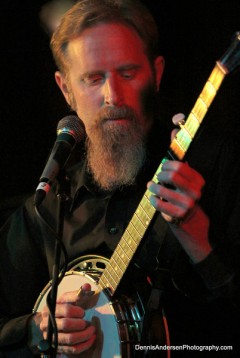
Jason Weiss. Photo by Dennis Andersen.
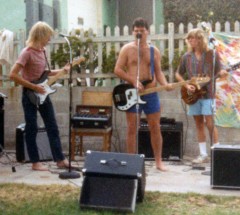
Jason with his first band, the Missionaries
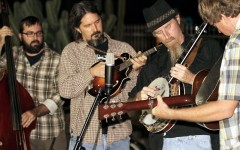
Jason (second from right) with his Plow bandmates: Doug Walker, Chris Clarke, and Joe Pomianek
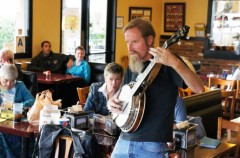
Jason leads the weekly jam session at Today’s Pizza.
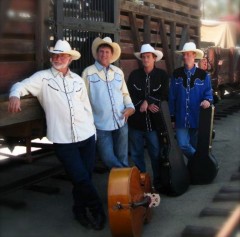
Jason (far right) with the Taildraggers
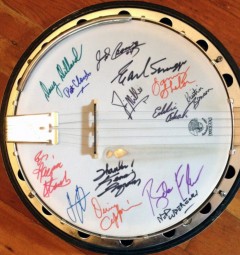
Jason’s prized banjo, signed by all the banjo greats
San Diego is blessed with many talented acoustic and roots musicians. Some are fairly high profile, are bandleaders, or otherwise manage to find the limelight they deserve. Some, however, toil splendidly as sidemen, as multi-instrumentalists, and as part of the core foundation of many of our top musical groups. Jason Weiss has all the talent in the world and fills the latter role with grace and style.
Jason Weiss was born in London to a British mother and a U.S. Navy chief father. He has one sister, Samantha, but is the only one in the family pursuing music. Apparently, though, the banjo is deep in his history. His mother reports that Jason’s grandfather was a banjo playing train man. As Jason notes, “The best I can tell, he played English banjos, which are five-string. He was also a railroad man — he worked on steam locomotives. My mom tells a story of visiting him at work as a little girl. He came out from underneath an immense locomotive. He was covered in grease, so completely black that my mother didn’t recognize him. I think of that when I hear the line ‘he turn and he said to his black, greasy fireman . . .’ ‘In Wreck of the Old ’97.’” Jason’s family moved to the Otay Mesa area of San Diego when he was three years old after his navy dad retired.
While living there as a youngster he encountered neighborhood kids who were musical and he began to hang out with them. He toyed with lots of instruments including the piano and was exposed to pop and other music by his mother who had a large record collection that included big band jazz, which he liked quite a bit even at an early age. The family lived in the Otay area until his parents divorced when he was about five, and at the age of 12 he and his mother, Paulina, moved to the Del Mar area after she remarried.
Jason’s mother remembers that she first noted her son’s interest in music when he was six or seven after he wandered into an elementary school violin class and was so captivated he would not leave. The teacher called his mom and asked if this musically precocious youngster could join the class, which Jason did. He later attended local Del Mar public schools and graduated from Torrey Pines High School in 1987. In junior high, at Earl Warren Junior High in Solana Beach, he took up band where he played saxophone.
It was in high school that he became devoted to the guitar while attending Torrey Pines High School where he was exposed for the first time to Jimi Hendrix and Eric Clapton, which lead him to Robert Johnson and the early blues masters. The high school teen was way into Jimi Hendrix as he readily concedes: “I played a Jimi Hendrix-like version of the ‘Star Spangled Banner’ at the Talent Show one year, including feedback, whammy bar tricks, and playing part if it with my teeth as Jimi did.” Jason actually built an alter to Jimi Hendrix in his bedroom.
Even though consumed by teenage guitar, lurking deep in Jason’s psyche was his early exposure to the recording of “Dueling Banjos” from the movie Deliverance, which features Eric Weissberg playing banjo on the iconic theme song. The drive and sound of that banjo mesmerized young Jason.
After he received the record, he played that tune over and over and over, learning how to play it backwards as well as forwards on his record player, until he literally wore out the record and the needle. The banjo had touched something deep in his musical soul, but as is common at the high school age, it was temporarily suppressed in favor of the more glamorous electric guitar and rock ‘n’ roll.
Jason’s first guitar was a cheap copy of a Les Paul that was so poorly made he had to move the bridge to try to get it into tune. Later, he moved up to a Fender Stratocaster, which he acquired at San Diego Guitar Trader.
In high school Jason’s first band, the Missionaries, played blues rock influenced by Stevie Ray Vaughan, Jimi Hendrix, Eric Clapton, and other guitar icons of the era. The Missionaries strutted their stuff at teen parties and dances. Jason continued his band activities, but was drawn more and more to the electric guitar, rock ‘n’ roll, and blues.
After high school Jason desperately wanted a career in music and took his dreams to Hollywood. He enrolled in the Musician’s Institute where he studied guitar. Earlier, Jason had attended Hal Crooks jazz school in San Diego and had taken a few lessons from Joe Pass as well. He liked the music theory, the learning, and the mathematical beauty and integrity of the music he was learning, and figured continuing that path in Hollywood was the way to go.
Alas, the Hollywood experience was anything but a dream. It was wild and out of control, and to his surprise Jason found that being in the music school was a liability, not an asset. His talent and his training seemed to count for little in the cut-throat Hollywood world.
This experience disappointed and disheartened him so much that he left Hollywood very disillusioned with music and with life. In his early twenties, he found himself directionless and a bit lost. He figured he had to find something other than music to which to devote his life.
He returned to San Diego an unhappy man where he attended San Diego City College, but he soon transferred to UCSD where he majored in math, a subject that had always appealed to him. He had already learned that mathematics and music have much in common, and he liked the stability and precision of math, as opposed to the fickle and unfriendly Hollywood experience. Jason graduated from UCSD in 2000, cum laude, with a BA in math and philosophy. Some would say, a perfect mix for music!
With a degree in hand, and all his musical instruments gathering dust in the closet, Jason obtained a teaching certificate and began teaching school at the School of Creative and Performing Arts in San Diego. Although he was an outstanding teacher, he had another frustrating and disappointing experience as he encountered the realities of trying to teach young minds, which don’t always want to learn and often have other priorities. A perfectionist, Jason reports frustration at his inability to achieve 100% success in exciting young minds. Jason: “When I asked myself if teaching was my calling, the answer that came back was ‘no, music is.’”
At the lowest and most depressed point in his young life, having absorbed a depressing experience in Hollywood and disillusionment teaching, Jason traveled with his mother to Louisville, Kentucky in 2002 for a Christmas get together with relatives. Upon arriving, he noticed that his uncle had a banjo in the house, which Jason picked up to play. It was love at first pick, and Jason spent as much time as possible in his uncle’s room with that banjo.
Upon returning home Jason acquired his first banjo, a Deering Good Time banjo, which he played for hours every day becoming more and more consumed by the instrument and its music. Earl Scruggs, Doug Dillard, and other banjo greats had him hooked.
Everything changed. He felt better about himself and about life, and realized that no matter the hardship, following a life of music was his passion and what he needed to do. He was, he says, truly “saved by the banjo.” Quite simply, he and his savior, the five-string banjo, had to follow a musical career. As most local musicians realize at some point, making this choice is true to one’s soul but is a daunting financial decision. It is very difficult to make a decent living as a local roots or acoustic musician. As the old joke goes: how do you make a million dollars in roots music? Start with 2 million! Amen.
However, Jason was driven to his music and really had no choice. His early exposure to “Dueling Banjos” still resonated in his head, and coming to the banjo in his early thirties was a homecoming that he knew felt right. Let the finances and chips fall where they may, Jason was going to make a life of music.
Jason devoured the banjo. He played day and night, learning and perfecting rolls, chopping, and lead playing. Applying his prodigious musical knowledge and experience, he was soon playing traditional bluegrass banjo as well or better than anyone in San Diego.
He counts among his major early influences Earl Scruggs whom he heard play on the “Beverly Hillbillies” TV show and whose recordings Jason later devoured line by line. Eric Weisberg was also an early banjo influence. These icons of the banjo led Jason to Bill Monroe, Flatt and Scruggs, Ralph Stanley and the Stanley Brothers, and other bluegrass greats, hence giving him a solid bluegrass repertoire. Other strong influences included Don Reno, JD Crowe, and Jim Mills.
Beyond that bluegrass foundation Jason was soon taking the banjo in new directions, influenced by modern banjo artists like Bela Fleck (Bela Fleck and the Flecktones) and Noam Pikelny (Punch Brothers) with chromatic lead lines, and creative attacks that have come to characterize his style. He can play a hard-driving Scruggs style of banjo that produce foot tapping grins on classics like “Foggy Mountain Breakdown,” but he can also deliver jazz-influenced lines uncommon on the banjo and, when called for, he demonstrates a prodigious ability to produce melodic and gentle lines.
Jason has played in many standout local bands. His style and delivery are unique, and one need hear only a few bars to know if it is Jason picking the banjo. His first real bluegrass band experience was with Les and Lou Ann Preston whom he met through his mother who attended the same church. Les Preston, now deceased, was a knowledgeable devotee of all types of American roots music, including bluegrass.
Les took Jason to the Sunday bluegrass jam then held at the home of Amos and Emma Radcliffe in Clairemont, a jam that had been ongoing for more than 30 years. Jason met other local bluegrass players there and truly honed his bluegrass banjo skills. Jason was a regular at these jam sessions for several years until Amos passed away and Emma moved back to Minnesota. Jason was soon playing in the Les and Lou Ann band, performing at many local gigs and events and drawing notice for his banjo skills.
Sadly, Les Preston died suddenly at a young age, a real shock to Jason. Les had been a major mentor for Jason and was very inclusive and open minded as to all forms of music. Jason carries this influence with him today. It was through this early band experience that Jason formed his open attitude about music and the banjo, recognizing that many styles of, and approaches to, music had merit, and that he could excel at dipping into lots of them incorporating parts of each into his own personal style.
Next, Jason joined the Bluegrass Ramblers with Bob and Paula Pearson, Tanya and Larry Rose, Dave Avery on bass, and Don Hickox on fiddle where Jason’s banjo was the signature instrumental sound of the band. This band played out a lot and gave Jason much good experience. Among other high profile gigs, the Bluegrass Ramblers opened for Ralph Stanley and the Clinch Mountain Boys at the El Cajon Performing Arts Center and Jason now proudly displays his banjo head with Ralph Stanley’s autograph.
Bob Pearson of the Bluegrass Ramblers notes:
“It’s worth remembering that Les Preston took many new pickers under his wing to play with his group. And Jason was one, along with Paula and me, John Mailander, and Alex Finazzo.”
Subsequent bands for Jason included Superstrings, with Bill Frisby on guitar, Given Harrison on bass and mandolin, James Rust on tenor guitar and Don Hickox on fiddle. This band excelled in technical prowess on the instruments and in playing high-powered classics as well as more modern bluegrass-style music. The talent in the band facilitated Jason in elevating his own chops and in appreciating, and contributing to, a dynamic sound characterized by high-caliber instrumentation, a trait that still characterizes Jason’s music. Jason also took on fill-in positions with other bands, such as the Full Deck, Gone Tomorrow, and others, becoming the number one fill-in and session banjo player in town. There is hardly a San Diego acoustic band that hasn’t played with Jason at some point in its career. As Jason readily admits, he was and is game for anything musical that wants a banjo. He has filled in with Christie Bruneau, Driftwood, Gone Tomorrow, the Galapagos Mountain Boys, Robin Henkel, and Sara Petite among others.
Jason’s current bands include the Taildraggers with Given Harrison on bass, Dan Sankey on fiddle and mandolin, and Michael Williams on guitar. The Taildraggers are one of the most respected bluegrass bands in San Diego, having played the Summergrass Festival, the Santee Wine and Bluegrass Festival, as featured band for both the San Diego Bluegrass Society and the North County Bluegrass and Folk Club, and a variety of other important dates.
The band started out as Captain Maple and Fresh Varnish, named by Given Harrison for his classic woodie (a car style that features wood paneling; also popular with surfers from the 1950s and 1960s), honoring the fact that the band played at several woodie shows and events. The band name kept changing until the group had a gig at Montgomery Field for a group of pilots who flew taildragger airplanes (planes where the tail rests on the ground until take-off.) For that gig the group took the name Captain Noonan and the Taildraggers, but the name was soon shortened to the Taildraggers, and that name stuck. The band really found a groove when it landed a weekly gig at Hensleys in Carlsbad where the Taildraggers, and Jason, played for many months perfecting their chops and their sound.
The Taildraggers lead singer, Michael Williams, offers this:
“Jason is so versatile, when we’re on stage all he needs to know is what key are we in and when do we start. Seriously, Jason is a terrific player with great timing and precision and he has a way of playing beyond the typical three-finger banjo rolls. In the middle of a solo he’ll throw in jazzy, florid … beautiful stuff that I can’t really describe, but it always sounds awesome.”
And, musical mate Given Harrison chimes in:
“Jason is one of the tastiest players I’ve encountered. The banjo has a tremendous capacity to produce loud sounds, and it takes most folks some time to learn to temper their touch. Jason’s had a tasty touch from the get-go, which has given him the opportunity to play a wider range of styles and genres than most players of the instrument.”
Jason also plays with Chris Clarke and Plow, another highly respected local band. Plow is Chris Clarke on mandolin, Joe Pomianek on guitar, Jason on banjo, and Doug Walker on upright bass. Chris Clarke had this to say about Jason:
“Jason is a mathematician and approaches the banjo as if it were a quadratic equation — his intimate knowledge of Scruggs-style banjo, dedication to practice and learning, and his heart all combine to produce a sound that is anything but square. I absolutely love playing music with him!”
Showing his broad-tent approach to music, Jason also plays electric banjo with a group called the Sick String Outlaws. This group is comprised of Ron Houston, guitarist; Rizzy Rizbourne, electric bassist; harmonica player Drew Holiday; drummer/percussionist Eric Alan; banjo pickin’ Jason Weiss; and backup vocalist Marcy Houston. The group plays loud, rowdy country rock music. Among other high profile gigs, the band opened for David Allen Coe on the main stage in Ramona.
Perhaps not surprisingly , Jason is also pursuing jazz, playing with Gunnar Biggs and Toby Ahrens. They play jazz standards from Charlie Parker, Miles Davis, Sonny Rollins, John Coltrane, and the like. You may not think of the banjo as a jazz instrument, but in the hands of a skilled player like Jason it fits in beautifully. Furthering this direction Jason has formed the Lawn Chair Prophets, a jazz trio with Gunnar Biggs and Toby Ahrens, and another group, Banjo Slim and the Salty Dogs, which features electric banjo, bass, and drums. The Salty Dogs play blues, bluegrass, reggae, and rock. Jason is committed, prolific, and open-minded when it comes to music and life.
Jason’s discography can be seen on his web site at: www.banjoslim.com where one can sample his music and pick up copies of his CDs. He is currently working on a solo recording project of original material, including his catchy tune “San Diego Home,” which will feature Jason’s banjo and vocals. Jason has a home recording setup but is also considering other options for this project. For the banjo aficionados, Jason plays a Deering Golden Era banjo with a Tenbrooks tone ring made at a foundry in Switzerland.
Another aspect of Jason’s musical career is the jam session he conducts every Thursday evening at Today’s Pizza in Encinitas. The jam session was started by Bob Cox and his wife Karen more than 30 years ago but when Bob and Karen moved to Kauai in 2007 they passed their leadership role to Jason who has run the session ever since.
From 6:30 to 9 p.m. every Thursday night, musicians assemble at Today’s Pizza. A typical night sees anywhere from 20 to 40 participants. There is a music book from which Jason guides the group with a gentle and helpful hand. He calls on those who wish to solo and gracefully passes over those who do not wish to take the limelight. Participants chip in $5 each, which goes for pizza and salad for the group and for a small stipend for Jason. This weekly event allows Jason to use his teaching skills in a context he loves: playing music with friends and helping others learn. Read more about the Thursday jam session at: http://encinitas.patch.com/articles/after-all-these-years-weekly-bluegrass-jam-session-keeps-on-pickin.
When asked which local musicians he admires, Jason responds: trumpet player Gilbert Castellanos, blues master Robin Henkel, the Seventh Day Buskers, John Mailander, and multi-instrumentalist and banjo master Dennis Caplinger as among the many. When asked whose banjo playing he follows and admires including non-locals he notes Noam Pikelny (Punch Brothers), Bela Fleck (Bela Fleck and the Flecktones), Jim Mills (Ricky Skaggs and Kentucky Thunder), and JD Crowe (JD Crowe and the New South) as banjo standouts that he looks up to.
Jason has a few private banjo students and mentions that he likes banjo teaching when the students want to learn. His interest in music theory and mathematics makes Jason a standout teacher who is able to break down the music into its component parts and help the student access what otherwise can be complex and confusing musical patterns.
Always a contributor, Jason has also served several terms on the San Diego Bluegrass Society Board of Directors where he was instrumental in many SDBS activities, including their popular Tuesday jam sessions, their featured band night, and the Summergrass Festival. Jason also ran sound for SDBS for several years, caring for, setting up, and running quality sound reinforcement at Tuesday events and at special concerts.
When asked what he would like to be doing five to 10 years from now, Jason responds, “doing what I am doing now, only making better money.” Does he regret his decision to give up his day job and chase a musical career? Nope. Jason reports that he is much happier playing music and being poor than he was as a teacher or in any of the other nonmusical roles he forced himself to try. Summing it up quite simply, Jason reports, “ the banjo saved my life.”










